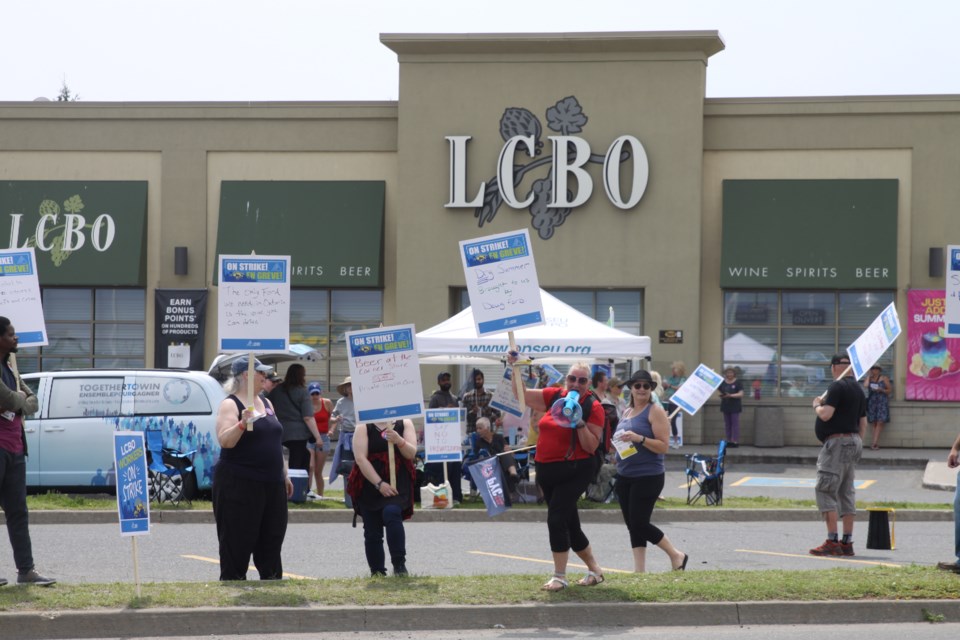THUNDER BAY – The vice-president of OPSEU local 741 said striking workers are “feeling pumped up,” however nobody is excited to be on strike.
“We'd rather be at work serving the people of Ontario, but we're passionate about protecting the public revenue that the LCBO generates for the province," Mo Marsonet said.
The main “sticking points” are wanting to keep spirits at the LCBO instead of in grocery stores and convenience stores, she said.
“We want to grow Ontario – to expand service and we want to support the public. That’s why we’re here.
“We also want protection for jobs for our LCBO employees. We want more full-time positions for the employees, we want less casual work. We want to protect distribution.
“Right now, there's some private warehouses that are shipping out some of our product. We want to bring all of that back.”
Marsonet said the people of Ontario have to remember that when they’re not shopping at the LCBO, the profits from those sales go back into private hands, they go to shareholders and go back to billionaires.
“We don't know where it's going, but it's not going back to Ontario.
“You’ve got to support us, it’s good for everyone,” Marsonet said.
Gary Kemp, an LCBO employee, said he has been casual for almost 10 years.
“It's how you start off. You don't interview for a full-time job – you have to work your way up into that position to get a full-time job.
“Most of us that work there now are still casual,” Kemp said.
He said it’s been really difficult.
“You start off and you have to make a commitment to be available to work, but they have no obligation to schedule you to work so it can get really hard. There's no guarantee of hours at all.
“You’re trying to live on the assumption that you're going to get hours and you don't always get them. As you progress, the amount of time becomes less and less a factor. But when you're first starting out, it's very difficult to make ends meet.”
There are times when you make the choice as to whether you're going to eat or pay the rent, he said.
“It gets really tight sometimes. There was a time that the LCBO, we thought of it as being 'the job.' It was the place to work.
“Unfortunately, that's not the case anymore. There's so many of us that are struggling just to get by,” Kemp said.
Even as a casual employee, Kemp continues to make the LCBO a priority.
“You have to commit. You apply and say I'm available to work at these times.
“Lots of us do have second jobs. But the less hours that you put in, the longer it takes you to get a full-time position.”
Kemp said you are never guaranteed a full-time position.
“You can only apply when a full-time position becomes available. You then have to apply for that position and based on your record and lots of things you have to interview for it like it's a new job.”
Kemp said the number of hours that you have put in and the amount of time that you have been there gets taken into account for being eligible to be a full-timer. But until a position actually becomes available it doesn't matter whether you're eligible to be a full-timer, you still have to stay as a casual.
“There are so many things that they could make different. They could make permanent part-time positions available rather than casual positions – where you actually get some of the benefits of still being a permanent employee even if they haven't got the full hours to apply for you.
“There are so many ways that we as the LCBO can grow and provide more service to the general public and still keep the funds that come into us publicly,” Kemp said.
Anne Makela, manager of the Kakabeka LCBO, reiterated that they are fighting for the protection of jobs.
“We're fighting to keep the revenues back in our province rather than going out to the big CEOs. We are also fighting for good jobs because 70 per cent of our employees are casual that have no guarantee of hours. They have no benefits, no sick time, no vacation time.
“That's what we're fighting for – the good jobs, keeping the revenues in our province and to expand the LCBO rather than putting (alcohol) into more convenience stores and corner stores and gas stations where the public and the young kids can get at it more easily,” she said.
Makela said with the expansion that Doug Ford is planning, that means closures of some LCBO stores. It means layoffs of full-time people and no hours for casuals staff.
